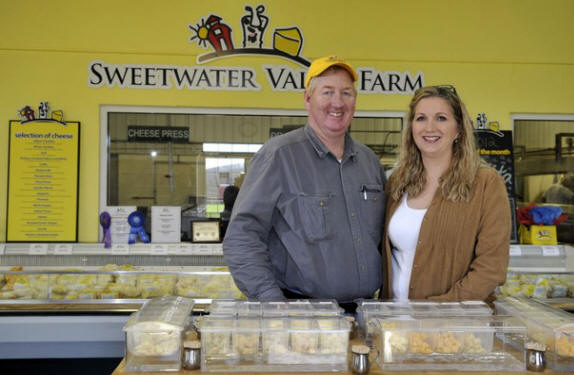
John and Celia Harrison of Sweetwater Valley Farms
Top Farm

John and Celia Harrison of Sweetwater Valley Farms
Innovation makes Sweetwater Valley top farm in nationLarisa Brass-knoxnews.com PHILADELPHIA, Tenn. — Sweetwater Valley Farm has never been your "typical" sort of dairy. Unlike many local farms, with property and business handed down from one generation to another, John and Celia Harrison started from scratch. They found a partner who had the equipment and land in Loudon County, which the couple later bought from him. They bought some cows and figured the rest out along the way. Today, the 1,000-cow farm features a cheese-making operation, a 5,000-square-foot event and educational center called the "Udder-Story," and a roster of about 13,000 visitors each year. This year, taking advantage of lower land prices brought about by the economic recession, the couple has bought a nearby farm and will have a 350-cow satellite dairy operational within the next couple of months. As a result of these efforts, the Harrisons were recognized as Innovative Dairy Farmer of the Year by the International Dairy Foods Association. The couple received the award at the organization's annual forum in California last month. It is the only Tennessee farm to receive the distinction. "In a variety of ways, the Harrisons demonstrate innovation and creativity at the farm level and in marketing their products," the International Dairy Foods Association said in a statement. The agriculture trade group bestows the award in partnership with the industry publication "Dairy Today." In addition to the diversity of its operation, the farm was recognized for its use of technology, including a milking system that uses pedometers to determine when a cow is in heat and ready for insemination. The dairy features tunnel-ventilated, sand-bedded barns designed to keep the creatures comfortable, particularly in the summer when heat can hamper breeding and milk production. In response to new government regulations regarding waste, the Harrisons also are installing a state-of-the-art management system that will include three holding ponds that prevent off-site release of waste. That project is scheduled for completion this summer. "I've always had the philosophy there's a whole lot of stuff you can't control," said John Harrison. "But, if you can stay ahead of the pack, you can survive what you run into." In the late 1990s, that meant launching a cheese-making operation to diversify and cushion against low milk prices. Recently it's meant putting more emphasis on the old-fashioned dairy business, which makes up the lion's share of Sweetwater Valley Farm's revenue. For more than a decade, East Tennessee farmlands were rapidly giving way to residential development and land values soared. The recession, however, shut down the real estate market, and the Harrisons are taking advantage. They recently acquired a 130-acre farm "across the Interstate" from the current operation in Philadelphia, according to John Harrison, and are looking for additional investment opportunities. "Three years ago we felt like we bought all the land we could buy," he said. "Agricultural production is in a very positive mode today." For most of the past nearly three decades, John Harrison has managed the farm while Celia Harrison has pursued a career as an emergency room physician. The couple has five children. Three years ago, however, she took over business operations at the dairy, while continuing to work part-time at Sweetwater Hospital. She focuses on the tourism and retail aspects of the farm. From March to October, visitors can take a walking tour of the farm. And the recently erected, 5,000-square-foot events barn and Udder Story educational center have been well received, she said. "I think the Udder Story has been wildly popular," Celia Harrison said. "The public in general wants to know where their food comes from." The Harrisons work together to determine which agri-tourism and marketing opportunities make the most sense to pursue. "If it's not profitable, why are we knocking ourselves out?" Celia Harrison said. Sweetwater Valley Farm was nominated for the award by two employees of Dean Foods Co., which buys the farm's raw milk. Harrison admits an irony, as he is one of the early plaintiffs in what is now a class-action lawsuit against dairy giant Dean as well as national cooperative Dairy Farmers of America. The lawsuit accuses these and other entities of conspiring to reduce competition and lower wholesale prices paid to farmers for milk. The case has not yet gone to trial. Harrison is encouraged he now can sell milk directly to Dean — the company locally processes milk at Mayfield Dairy Farms' plant in Athens — instead of going through the cooperative. Still, he said, the milk market needs to be more competitive. "I'm pleased that Dean is buying (from us) directly," he said." I'm still really concerned where we are in the industry. Give me at least two buyers, and I'll be satisfied." When he learned of the award, John Harrison said he was "shocked" and pleased. "I really didn't think there was a chance of winning," he said. For Celia Harrison, reality didn't strike until the couple were ready to walk on stage before hundreds of fellow farmers and others in the dairy business from around the world. "I said to myself, 'Enjoy the moment,'" she said. "'This is a big deal." |
BACK
2/2/12